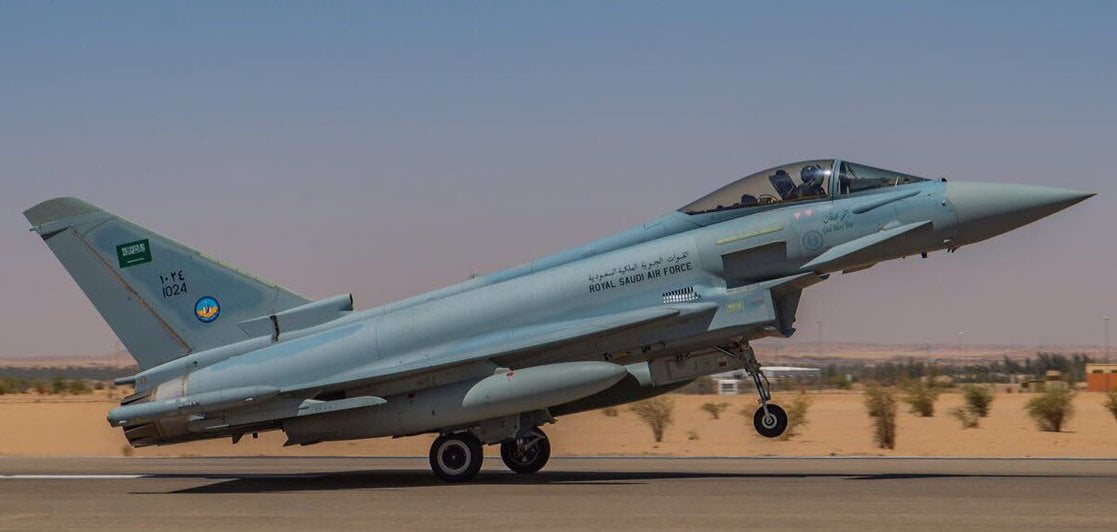By Pierre Tran
Paris – Germany’s renewal of an arms embargo on Saudi Arabia effectively casts doubt as the lead partner for France to build a future fighter jet, drone, and tank, key projects to boost consolidation in the European defense industry.
Berlin on March 28 extended by a further six months a ban of the sale of weapons to Riyadh. German imposed that sanction last October in the wake of the slaying of journalist Jamal Kashoggi by Saudi officials in Turkey.
There is some easing on existing contracts but the renewed embargo forbids new German arms contracts with Saudi Arabia and slows delivery on existing deals, effectively dragging shipment of parts to maintain equipment in service.
Britain and France have privately and publicly lobbied Germany to ease that clampdown.
For London, the restriction hinders hopes of signing a contract worth £10 billion ($13.2 billion) for the sale of 48 more Eurofighter Typhoon jets to Saudi Arabia.
Germany is a partner of the Eurofighter consortium through Airbus and engine builder MTU.
Paris has urged Germany to slacken the sanction, which blocks delivery of key German subsystems for the MBDA Meteor long-range, air-to-air missile, to arm the Typhoon.
This embargo casts a shadow on how much Paris can rely on Berlin as lead partner on the Future Combat Aerial System, a vast project including a next-generation fighter jet, drones flying as remote carriers and smart cruise missiles.
France may lead on the FCAS project but export efforts will require German approval.
That reliance on Berlin’s green light extends to Franco-German plans to design and build a future tank, dubbed Main Ground Combat System, and new artillery, named Common Indirect Fire System. Germany will lead the programs for those land weapons.
Berlin also takes the lead industrial role in a European medium-altitude, long-endurance drone, another major bilateral project with Paris.
Those cooperative projects will be key to a consolidation of European industry and interoperability with the services. Spain has signed a letter of intent to join the FCAS project.
Dassault Aviation is piloting the next-generation fighter project, which seeks to maintain a French bid to retain national sovereignty on an important capability.
But while it is critical to be able to design and build an advanced combat aircraft, its profitability will hang on selling as many jets as possible. And for that, German consent will be essential.
French and German officials have long held talks behind closed doors to update bilateral rules for arms exports, but they have so far failed to reach agreement.
The officials have sought to agree the threshold of German or French content in a weapon system which would require just one nation’s approval for foreign sale, not both countries.
Those negotiations are critical to KNDS, which partners French state-owned Nexter with German privately owned KraussMaffei-Wegmann. That joint venture plans to build the successor to the Leclerc and Leopard tanks and the new artillery.
A reluctance to sell weapons to Saudi Arabia and tardiness in agreeing a new export regime reflect the need to reach consensus in German domestic politics, said François Lureau, a former French arms procurement chief.
In Berlin, the coalition government led by the conservative Christian Democrats must negotiate with their junior partner Social Democrats. The center-left party takes a dim view of arms sales and seeks to limit deals with countries in the EU and NATO.
Chancellor Angela Merkel has called for closer cooperation with European allies on arms exports, but it will be her successor, Annegret Kramp-Karrenbauer, who must find a politically acceptable solution.
Consensus is the German way, Lureau said. It will take time, but an agreement will last.
That party political debate has led to some compromise in the arms ban on Saudi Arabia.
Cooperation with European allies in joint projects was allowed to go on, as long as fresh conditions were observed, The Telegraph, a British daily, reported.
Fully assembled new weapons should not be sent to Saudi Arabia, was one of the conditions.
That looked like a ban on delivery of new Eurofighters.
European partners of Germany may supply weapons to Saudi Arabia, but those arms should not be used in the civil war in Yemen, was another condition.
The British foreign minister, Jeremy Hunt, wrote a private letter earlier this year to his German counterpart, calling for an easing of the crackdown, which hurt BAE Systems, the British partner on the Eurofighter and supplier of spares for the Tornado fighter.
Florence Parly and Bruno Le Maire, the French armed forces and economy ministers, have also called on Germany to relax the sanction, to little avail.
“It is useless to produce weapons through improved cooperation between France and Germany if we are unable to export them,” Le Maire told Welt am Sonntag newspaper, Reuters reported.
“If you want to be competitive and efficient, we need to be able to export to countries outside Europe,” he added.
Berlin’s reluctance to authorize foreign sales from European partners extends beyond Riyadh.
Arquus, a French builder of light armored vehicles, finds it hard to pitch its products not just to Saudi Arabia and Egypt but also Indonesia and India, said CEO Emmanuel Larcher, business daily La Tribune reported Feb. 6.
German clearance was slow for automatic gearboxes and engines, which may be civil products but they would be fitted on military vehicles.
Sale of those German products is not banned but a lengthy regulatory clearance is seen as effectively forcing the German suppliers to practice “self censorship,” forcing Arquus to look elsewhere, he said. The French company relied on US firm Allison and German manufacturer ZF for gearboxes.
In the long term, development of new technology such as batteries will break out of “this vicious circle,” he said
Featured photo of Saudi Eurofighter.
Source: http://www.aviationanalysis.net/2017/09/saudi-eurofighter-typhoon-crashes-in-yemen.html


